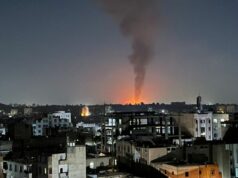Protests against Prime Minister Netanyahu began over the weekend as tens of thousands of people across towns in Israel came out onto the streets demanding that he resign over his failure to bring back the hostages. According to the Times of Israel, over 100 tents were pitched outside the Knesset in the capital Tel Aviv as the protesters demanded the “crime minister” – their nickname for Netanyahu – go immediately. Organisers estimated that over 100,000 people had joined the protests, which also took place in Jerusalem, Haifa, Be’er Sheva, Caesarea and other cities over the weekend.
The protesters said Sunday was the first day in a four-day protest.
Israeli Opposition leader Yair Lapid also made a statement calling for early elections and attacked the government for attacking the families of the hostages. Taking to X he said, “One after the other, the ministers of the government go on air this morning and attack the families of the abductees. You are out of your mind. Young women, elderly people, children were kidnapped on your watch. For half a year, you fail to bring them home, and then you blame their families? This government of destruction must go home. Election now.”
Israel’s coalition government is starting to feel the pressure. Heritage Minister Amichay Eliyahu lashed out on local Israeli television station Channel 12 stating that their protests on Saturday has only provided a “gift to Hamas.
“The protest in Ayalon was violent … For Hamas, this is a gift. This has the opposite effect, and weakens the soldiers on the front,” Eliyahu told Channel 12.
It isn’t just the families of hostages that are creating a headache for the government. Fights broke out in Jerusalem between Haredi Jews and the Brothers in Arms group over the issue of military conscription that is slowly dividing the nation. Haredi Jews are ultra-Orthodox Jews who have not had to serve compulsorily in the military as other Israelis have to do. And as the fighting in Gaza has gone on, the other Jews have to view this as an insult and the Brothers in Arms – an organization of reserve men and women from various units in the IDF have taken to attacks against them.
Given that Orthodox Jewish parties make up part of Netanyahu’s right-wing coalition it has been no surprise to find the government coming down on the military reservist organisation. If they were to leave the government, the country would be forced into new elections with Netanyahu trailing significantly in the polls. It is no wonder that the government has remained firmly on the side of the Haredim. A Times of Israel report quoted National Security Minister Itamar Ben Gvir as saying on Sunday that the Brothers in Arms organisation had “engaged time and time again in stirring up fratricidal war and the division of Israeli society.”
In all this, the prime minister is believed to have approved the departure of a delegation to Cairo where indirect talks between Israel and Hamas are set to take place. The talks come one week after talks in Qatar collapsed with the Israeli delegation coming home. The talks have been deadlocked so far because Hamas has demanded all northern Gazans be allowed to return home and hostages be conditional on a full Israeli pullout from Gaza. Both demands have been rejected by Israel so far.
But the troubles at home and the growing international pressure on Israel may cause the prime minister to rethink this time round. At the end of a press conference earlier in the day Netanyahu responded to a question asking him why world opinion had turned against Israel on Gaza. “What has happened in the past few months was that the terrible massacre of October 7 was quickly forgotten and the whole world is ganging up on us. And there are people here and abroad who say maybe there’s something to this; maybe we’re really not okay.”
Netanyahu added in the press conference that these “good people” should reflect on why “not a word was said about the millions massacred or uprooted from their homes in the Syrian civil war, or in Yemen’s internal war and elsewhere? And on the much smaller number — every dead civilian, every such loss is, of course, a tragedy, but it can’t compared; we are talking about very small numbers, compared to the massacre of millions… how can it be that the worst things are believed: Genocide, those claims against the state of Israel?”
Traveller, bibliophile and wordsmith with a yen for international relations. A journalist and budding author of short fiction, life is a daily struggle to uncover the latest breaking story while attempting to be Hemingway in the self-same time. Focussed especially on Europe and West Asia, discussing Brexit, the Iran crisis and all matters related is a passion that endures to this day. Believes firmly that life without the written word is a life best not lived. That’s me, Ashwin Ahmad.





